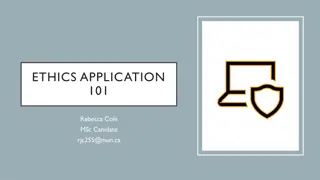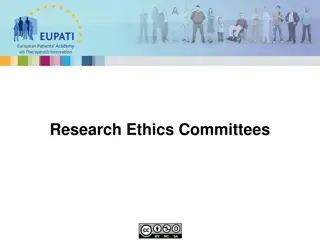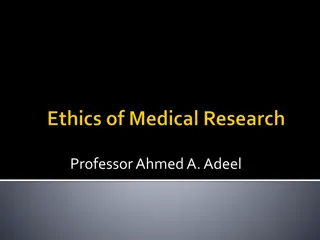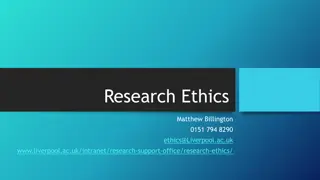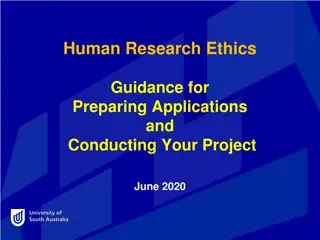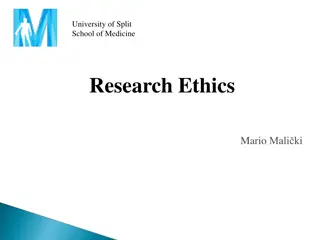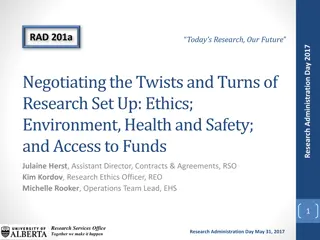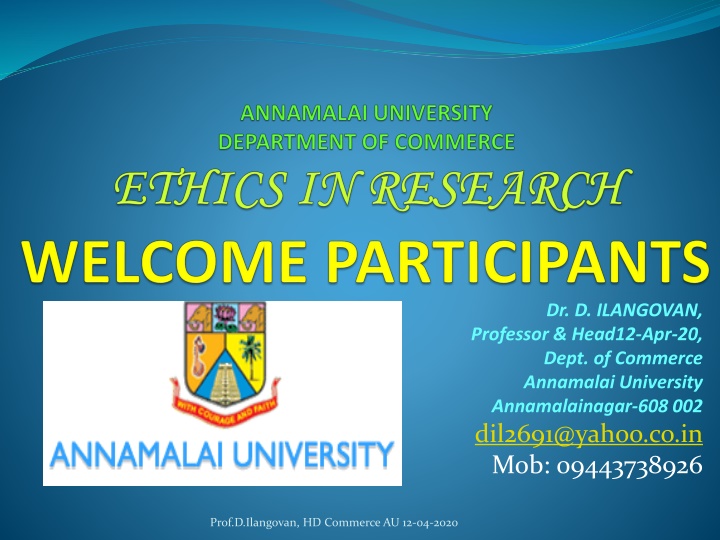
Ethics in Academic Research: Prof. D. Ilangovan Insights
Explore the ethical dimensions of academic research through the perspective of Prof. D. Ilangovan. Discover the social nature of research, the importance of colleagues' participation, and the intersection of ethics and morality in the research process. Delve into the chain of discovery, the impact of research on values, and the role of technology, society, and politics in shaping research endeavors.
Download Presentation

Please find below an Image/Link to download the presentation.
The content on the website is provided AS IS for your information and personal use only. It may not be sold, licensed, or shared on other websites without obtaining consent from the author. If you encounter any issues during the download, it is possible that the publisher has removed the file from their server.
You are allowed to download the files provided on this website for personal or commercial use, subject to the condition that they are used lawfully. All files are the property of their respective owners.
The content on the website is provided AS IS for your information and personal use only. It may not be sold, licensed, or shared on other websites without obtaining consent from the author.
E N D
Presentation Transcript
Dr. D. ILANGOVAN, Professor & Head12-Apr-20, Dept. of Commerce Annamalai University Annamalainagar-608 002 dil2691@yahoo.co.in Mob: 09443738926 Prof.D.Ilangovan, HD Commerce AU 12-04-2020
Research is social activity Research is not just a method and a system of organised knowledge It is a social activity carried out by groups of competing/co- operating/communicating scientists Prof.D.Ilangovan, HD Commerce AU 12-04-2020
Three dimensions of academic research Community meeting authority controversy publication sincerity theory experiment Person Knowledge Prof.D.Ilangovan, HD Commerce AU 12-04-2020
The participation of colleagues A key consideration concerns the status/rank/class of not just subjects but all participants including colleagues This will influence the ethical relationship/responsibility of the researcher. Not all people are equal. Colleagues may vary from superiors such as project leaders, equals but with varying degrees of experiences and status, to technicians and support staff. There is a special responsibility to colleagues with less experience or of a lower rank who may find it more difficult to refuse to participate. Prof.D.Ilangovan, HD Commerce AU 12-04-2020
But what has ethics got to do with research? Is pure research above ethics and morality? Is ethics and morality to do with technology and politics (the appliance of research) not research itself? Prof.D.Ilangovan, HD Commerce AU 12-04-2020
The chain of discovery Scientist with VOCATION - PSYCHOLOGY PSYCHOLOGY Research Discovery by METHOD - PHILOSOPHY PHILOSOPHY Publication Knowledge in ARCHIVE - HISTORY HISTORY Application Technology as INSTRUMENT - ECONOMICS ECONOMICS Solving problems Industry in SOCIETY - POLITICS POLITICS Prof.D.Ilangovan, HD Commerce AU 12-04-2020
The Impact of Research on Values and Values on Research Ethical considerations are to the fore with the development of new technologies and new social systems I m damned if they are going to make me redundant Society is inherently conservative and seeks to set the limits of research activity Prof.D.Ilangovan, HD Commerce AU 12-04-2020
The scope of research ethics Ethical considerations cover all aspect of research but they are fore-grounded when the subject of the research are humans or animals Prof.D.Ilangovan, HD Commerce AU 12-04-2020
Research involving human subjects in the Medical, Social and Behavioral Sciences poses complex ethical issues. It requires careful thought and consideration on the part of both researchers and research participants. Prospective participants must be given adequate information on both the possible risks and the potential benefits of their involvement to allow them to make informed decisions But it pays well It has its disadvantages Prof.D.Ilangovan, HD Commerce AU 12-04-2020
Ethical Issues Justification for the research Access to participants/Privacy Informed consent Potential harm Prof.D.Ilangovan, HD Commerce AU 12-04-2020
Ethical relationships with supervisors The relationship between the student and the supervisor is unequal and hierarchical. the supervisor plays many roles as "adviser", "promoter", "boss", "teacher", "friend", "principal investigator etc. This multiplicity of roles may lead to conflict the relationship may be or may seem to be coercive /abusive A student must feel free to make their own decisions Prof.D.Ilangovan, HD Commerce AU 12-04-2020
Ethical supervision Non-coercive Nurtures the student s confidence and skills Permissive Does not use the student just as a technician or assistant but allows the student to develop the project in new ways Not jealous of the student s success but allows the student to take ownership of their project and get the credit for it Prof.D.Ilangovan, HD Commerce AU 12-04-2020
Ethical relationships with colleagues Effective and ethical relationships with colleagues will aid a student to make more rapid progress on their project Prof.D.Ilangovan, HD Commerce AU 12-04-2020
PUBLICATIONS Are how the world sees you. Determine whether you get funding for further research or not! Determine whether you get promoted or not!! Determine whether you keep your job or not!!! Prof.D.Ilangovan, HD Commerce AU 12-04-2020
THE NEGATIVE DATA PROBLEM Prof.D.Ilangovan, HD Commerce AU 12-04-2020
THE NEGATIVE DATA PROBLEM Can negative results be important? Are they publishable? Would journals full of negative results sell? If they are not published are they doomed to be repeated wastefully? How can positive results be validated without knowing about negative ones? Prof.D.Ilangovan, HD Commerce AU 12-04-2020
Two types of authorship problem Gift Authorship Inclusion of authors who did not contribute significantly to the study this might include a PhD supervisor! Hierarchy (Expectation / favour) Colleagues ( Increase publications) Ghost Authorship Absence of Authors Professional writers ( Should be acknowledged) Hierarchical / political / personal reasons Prof.D.Ilangovan, HD Commerce AU 12-04-2020
Autonomy The ethical principle of autonomy means that each person should be given the respect, time, and opportunity necessary to make his or her own decisions. Prospective participants must be given the information they will need to decide to enter a study or not to participate. There should not be pressure to participate. Prof.D.Ilangovan, HD Commerce AU 12-04-2020
Vulnerable participants Potentially vulnerable participants such as children, the elderly, the mentally ill may be incapable of understanding information that would enable them to make an informed decision about study participation. Consequently, careful consideration of their situation and needs is required, and extra care must be taken to protect them. For example, how will you assess the diminished capacity of an elderly individual, who will be the guardian, and how and when will you involve another individual as guardian in the process? Prof.D.Ilangovan, HD Commerce AU 12-04-2020
The participants The participants may not have the experience or educational background in order to fully understand the implications of the research They may be swayed because of their respect of and trust in the researcher who stands as an authority figure If they are being paid for their participation they may be swayed by economic considerations from a free judgement of the risks Prof.D.Ilangovan, HD Commerce AU 12-04-2020
How to maximise your publications? UNETHICALLY! SALAMI-SLICING breaking up work into large number of small papers. TILING publishing sequence of substantially overlapping papers. DOUBLE-PUBLISHING publishing same work twice Prof.D.Ilangovan, HD Commerce AU 12-04-2020
Scratch my back and Ill scratch yours Peer review is not always entirely independent Many areas of research are small and highly competitive Prof.D.Ilangovan, HD Commerce AU 12-04-2020
Some senior scientists are intolerant of criticism and dangerous to cross. Prof.D.Ilangovan, HD Commerce AU 12-04-2020
PLAGIARISM Plagiarism is dishonesty. The research may be excellent but it wasn t done by the author of the paper. No point in trying to plagiarise published work. Plagiarism mostly involves unpublished theses. Difficult to detect unless editor/referee familiar with unpublished work in subject as well as published work. Sanctions seen as a default option now. Prof.D.Ilangovan, HD Commerce AU 12-04-2020
Consequences of Plagiarism Destroyed Student Reputation Destroyed Professional Reputation Destroyed Academic Reputation Legal Repercussions Monetary Repercussions Plagiarized Research
Central Universities 20 State funded universities 217 Deemed universities 45 Private deemed universities 57 Private universities under state 5 Other private universities 10 Institutes of national importance 13
Research Institutions in India 1. Indian Council of Medical Research 2. Indian Council of Agricultural Research 3. Indian Council of Social Science Research 4. Council of Scientific and Industrial Research 5. Tata Institute of Fundamental Research
Problems of Indian Higher Education Institutions - World Bank Study a. Over-centralization and lack of autonomy and accountability b. Resource constraints and wastage c. Poor quality and relevance in many institutions d. Difficulties in retention of Science and Technology personnel in education e. Poor technology and infrastructure support f. Limited access and regional disparity.
Reputed Institutions in India In the area of social and economic sciences. 1. Delhi School of Economics, New Delhi 2. Jawaharlal Nehru University, New Delhi 3. Tata Institute of Social Sciences, Mumbai 4. Indian Statistical Institute, Kolkata. I. III. In the technical and engineering fields institutions have an excellent reputation: 1. Delhi College of Engineering, New Delhi 2. VJ Technical Institute, Mumbai 3. University Department of Chemical Technology, Mumbai 4. Thapar University, Patiala 5. Jadavpur University, Kolkata 6. University of Pune, Pune 7. Birla Institute of Technology and Science, Pilani. IV. In the area of fundamental science 1. Tata Institute of Fundamental Research, Mumbai 2. Saha Institute of Nuclear Physics, Kolkata 3. Indian Association for Cultivation of Science, Kolkata. II. In the field of Management: 1. Indian Institute of Management, Calcutta 2. Indian Institute of Management, Ahmedabad 3. Indian Institute of Management, Lucknow 4. Management Development Institute, Gurgaon 5. Indian Institute of Foreign Trade, New Delhi.
Functions of a Doctoral Committee To discuss, advise and recommend on all matters connected with the candidate s research from provisional registration till the submission of the thesis. To suggest courses to be undertaken by the candidate during the first year of his/her provisional registration, in the light of his/her attainment and with a view to fulfilling the requirements of the research. Such courses of instruction may be given as short term courses lasting from three to four months in such subjects as may be chosen by the Doctoral Committee and through seminars, discussions, occasional lecturers, laboratory techniques, field work, etc. To conduct the Part I course work and examination for the candidate by written and oral examinations, on the completion of such courses, at the end of the first year of provisional registration and to report to the University on the fitness or otherwise of the candidate to proceed with his/her research work for the PhD and recommending the confirmation of the provisional registration. To monitor the candidate s work periodically by directing him/her [a] to give periodical seminars on his/her work; [b] to submit reports once in six months on the candidates progress in research work in the prescribed format; [c] to conduct and supervise and presentation by the candidate of the final draft of his/her proposed thesis for approval before the submission of synopsis of the thesis to the University and to give a certificate to this effect to be submitted along with the synopsis. To suggest a panel of nine names (three from International; 6 from national (East, West and North) and three (from southern States of India) to be considered for appointment as examiners by the University, for evaluating the thesis and for the public viva voce examination.
ROLE OF A RESEARCH GUIDE Provide research guidance and supervision in respect of all components of the specified PhD course Design, formulate and prescribe course activity for relevant research preparation. Conduct and monitor the prescribed course activity and report its progress Suggest and guide the research student for participation in conferences, seminars and other colloquium Regularly follow up and monitor the progress . The research guides located outside India may have such personal meeting at least twice a year, one per semester, to provide block consultation of not less than one week s duration. Enable / connect the PhD student to active research groups or networks of relevance Suggest modifications/ changes if any required in the scope of the research study warranted by the external factors to make the study meaningful and relevant. Provide a quarterly progress report in the prescribed format for its review and feedback. Make valid recommendation of the study to the doctoral evaluation committee in accordance with the specific requirements as may be stipulated. Consult, cooperate and collaborate with the Centre for Research in best possible manner to ensure quality compliance
STANDARDS AND EXPECTATION FROM Ph.D. STUDENTS High standards of integrity, discipline and propriety in all matters concerning student s behaviour on academic as well as non academic matters inside and outside the campus. Any case of malpractice, like plagiarism, willful reporting of fictitious data etc. will be considered as a serious breach of discipline. Being enrolled in a full time program, students are prohibited from taking up any full time or part time work / engagement. Work Timing and regularity in attendance is compulsory. Leave can be granted on request Each student to actively participate in research seminars / conferences, held both within and outside the state in their area of work. Aminimum of 2 seminars/ conferences have to be attended by the student and paper presented therein. A minimum of 2 papers per year have to be written by student and steps taken to publish in reputed journals. The publications shall carry the name of the guide as the co author. Participation in the organization of in house research seminars / conclaves is mandatory. Students are required to meet once in a month as part of the research seminar series and present their work / progress to fellow participants and seek their comments.
Only 2% of India's Work Force is Employable The gap between theory and practice has become so wide in most areas that the world of practice simply ignores the educational certificates and degrees. The academicians and the education regulators have to take the blame for ruining 98% of our workforce with the potential to make India the HR hub for the world. The remainder of 2 % alone is employable on global standards Learn do learn system is what India requires. Learn learn and learn system based on irrelevant knowledge and old books in most areas will not work. The academicians will do far better by letting the students explore by interfacing with practioners in diverse domains, collecting information and know-how and sharing it back in the class room.
Standards Around the World In Belgium, the legislation prescribes the duties of the staff involving research, teaching and service provision. In Hungary, higher academic positions entail more requirements, and tasks are specified at central level, teaching by 70 %, or reduce it by 25 %. Researchers allot at least 90 % of their total working hours to scientific activity, in addition to contributing to the educational activities of the higher education institution. In Austria, according to the 2002 Universities Act, professors are responsible for research In Sweden Research assistants and associate senior lecturers should, however, undertake research primarily Individual annual workloads are determined by the institution, in accordance with the maximum limits defined by central authorities, in Germany, Italy, Poland, Romania, Slovenia and Slovakia.
Std. Contd In Luxembourg, the tasks of research professors are generally distributed as follows: research (50 %), teaching (40 %), other (10 %). At universities in Norway, academic staff in permanent employment have traditionally had an individual right to use 50 % of their working time for research. The methodological standards for this annual evaluation are established by the Ministry of Education and Research and are approved by the government. The weight of each criterion for each teaching position and seniority is established annually by the university senate, which may introduce other criteria and performance indicators that support institutional development and improve the competitiveness of the higher education institution. This is the story in many countries around the world.
How can you Ensure Quality in Research ??? Take the time to produce quality work that you can be proud of, and be thoroughly prepared for examinations. During an exam, don t sit next to someone with whom you studied, in case your exams end up looking too similar. Discourage academic misconduct among other students. During examinations, focus on your work, and do not look in the direction of other students. Take the initiative to shield your work to prevent other students from copying. Do not allow others to use your computer, user ID, or password Resist the temptation to share rough drafts and participate in peer editing without the consent of your instructor When using class notes for an assignment, ask yourself: Did this information come from me? Always document where and from whom you got your information (e.g., other students, professor, class text, web site). What can you do if you are unsure whether it is unauthorized collaboration or whether it is okay to work together? When in doubt, ASK!. Check your course syllabus or speak with your instructor.
Helpful Resources in USA Office for Students with Disabilities (A255 Murphy Hall) www.saonet.ucla.edu/osd Office of International Students & Scholars (106 Bradley Hall) www.intl.ucla.edu Student Legal Services (70 Dodd Hall) www.studentlegal.ucla.edu Student Psychological Services (Wooden Center West) www.saonet.ucla.edu/sps Center for Women and Men (B44 Student Activities Center) www.thecenter.ucla.edu Ombuds Office (Strathmore Building room 105) www.saonet.ucla.edu/ombuds www.mla.org American Psychological Association www.apastyle.org UCLA Department of English www.englishwww.humnet.ucla.edu UCLA Writing Programs www.humnet.ucla.edu/wp Your instructor (stay after class or go to office hours) College Tutorials (228 Covel Commons) www.myucla.edu, go to services, then workshops Counselors for your College, School, or Department Lesbian, Gay, Bisexual & Transgender Resource Center (B36 Student Activities Center) www.lgbt.ucla.edu Modern Language Association



